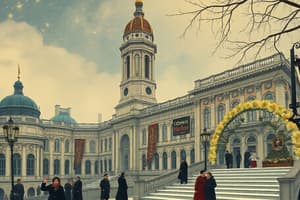Podcast
Questions and Answers
What event marked the end of World War I for Germany?
What event marked the end of World War I for Germany?
- The establishment of the Weimar Republic
- The signing of the Treaty of Versailles
- The signing of the armistice (correct)
- The abdication of Kaiser Wilhelm II
Which political parties were involved in the temporary government following the abdication of the Kaiser?
Which political parties were involved in the temporary government following the abdication of the Kaiser?
- Social Democratic Party (SPD) and the Independent Social Democratic Party (USPD) (correct)
- Social Democratic Party (SPD) and the Democratic Party
- Communist Party and the Free Democratic Party
- National Socialist German Workers' Party (NSDAP) and the USPD
What was a significant consequence of the public's dissatisfaction with Kaiser Wilhelm II?
What was a significant consequence of the public's dissatisfaction with Kaiser Wilhelm II?
- The establishment of a constitutional monarchy
- His abdication and the declaration of a republic (correct)
- A return to military rule
- The reformation of the German army
What factor contributed significantly to the social unrest in Germany by 1918?
What factor contributed significantly to the social unrest in Germany by 1918?
Which spark ignited mass strikes in Munich during the revolution?
Which spark ignited mass strikes in Munich during the revolution?
What was the immediate political outcome of Kaiser Wilhelm II's abdication?
What was the immediate political outcome of Kaiser Wilhelm II's abdication?
After the Kaiser's abdication, what kind of control did different political parties exert?
After the Kaiser's abdication, what kind of control did different political parties exert?
What was the primary reason for the pressure on the new republic to sign the treaty?
What was the primary reason for the pressure on the new republic to sign the treaty?
Flashcards
Armistice of 1918
Armistice of 1918
An agreement to end fighting in World War I on November 11, 1918.
Kaiser Wilhelm II's Abdication
Kaiser Wilhelm II's Abdication
When Kaiser Wilhelm II stepped down as emperor of Germany in November 1918.
Weimar Republic
Weimar Republic
The new German republic established in November 1918 after the Kaiser's abdication.
Council of People's Representatives
Council of People's Representatives
Signup and view all the flashcards
Social Unrest in Germany (1918)
Social Unrest in Germany (1918)
Signup and view all the flashcards
Allied Naval Blockades
Allied Naval Blockades
Signup and view all the flashcards
SPD and USPD
SPD and USPD
Signup and view all the flashcards
German Revolution of 1918
German Revolution of 1918
Signup and view all the flashcards
Study Notes
The War Ends
- World War I lasted from 1914 to 1918
- Fighting ended on November 11th, 1918
- Germany faced widespread suffering due to the war
- Naval blockades prevented imports of food and essentials
- Starvation was widespread in 1918
- Widespread public unrest and opposition to Kaiser Wilhelm II occurred
- Many Germans desired a democracy
Social Unrest Turned into Revolution
- November 1918: Situation in Germany was on the brink of civil war
- Public protests and SPD (Social Democratic Party) members demanded the Kaiser's resignation
- Kaiser Wilhelm II abdicated on November 9th, 1918
- Social Democratic Party and the Independent Social Democratic Party (USPD) declared a republic
The Socialists Set Up a Temporary Government
-
After the Kaiser's abdication, Germany was in disarray
-
Different parties contested control
-
Provisional national government formed by SPD and USPD
-
Called the Council of People's Representatives
-
Controlled Germany until January 1919
-
Elections held for a new Reichstag (parliament)
Studying That Suits You
Use AI to generate personalized quizzes and flashcards to suit your learning preferences.




